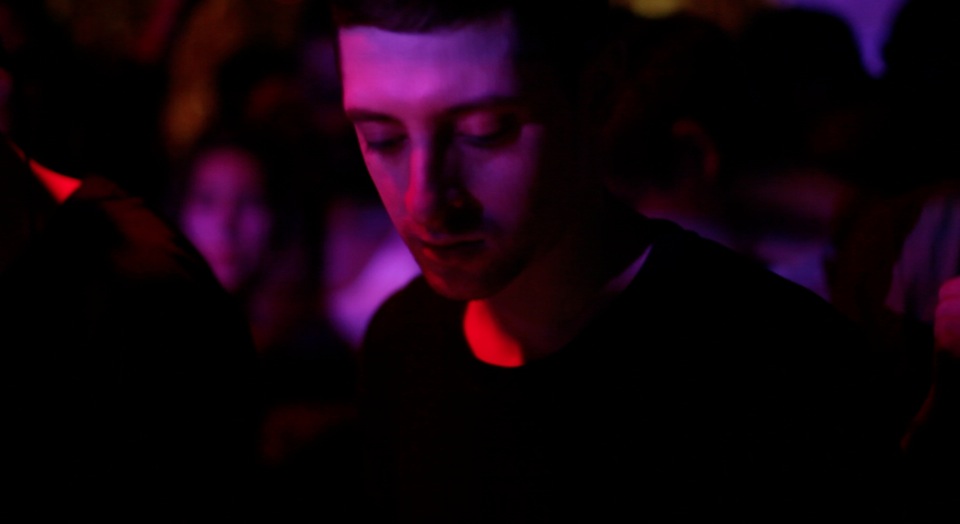UK CLUB LABEL CELEBRATES SIXTH BIRTHDAY BY SHARING GUIDELINES FOR RESHAPING CLUB MUSIC
London label Night Slugs has made a habit of turning the club space inside out. In 2010, when UK club music was awash in a sea of bass and 'post-dubstep', Girl Unit's "Wut" blew up like a laptop spitting out an orchestra: its trap stylings and ecstatic melody hit hard and, despite being on continual rewind, never got old. Jam City's 2012 debut album, Classical Curves , on the other hand, sucked the meat from house to leave gleamingly pristine bones that beamed new light into the dancefloor's corners. Earlier this month, just as Night Slugs was getting ready to celebrate six years in the biz (check the birthday tour dates below), label co-founder Bok Bok's released a collaboration with Kelela—"Melba's Call"— that upended classic R&B: the soul and attitude remain intact, but the fractured sonic lines that owe much to grime gave it a serrated edge. "Night Slugs is about breaking rules," says L-Vis 1990, aka James Connolly, the other half of Night Slugs. "It has been since day one. We want people to break rules if they can make a good track."
While they've long cemented their position as club innovators, Connolly and Bok Bok's Alex Sushon met in reassuringly prosaic circumstances: "I read about James on a blog. I went on his Myspace and found his email," says Sushon. Connolly went on to book Sushon for a gig in Brighton, where he was living at the time. Their friendship might have been cultivated in Myspace messages, but it wasn't until they were both slogging away at full-time jobs at creative agencies that Night Slugs got the push. "I was working all day and doing overtime at my advertising position and then going home and making music until 4am and then going in at 11:30am and somehow not getting fired for years," says Sushon. "I was commuting from Brighton to London and making tracks on the train to and from. My whole first EP was made on the train to work," picks up Connolly. "We spent a good six hours on AIM a day just throwing ideas back and forth. There were no clubs that were killing it for us, so we decided to do a party."
A regular night in south London led to a slot on former pirate radio station Rinse FM and a whole bunch of form-fracturing releases, including the Club Constructions series that Connolly kicked off in 2012 and Jam City, Lil Silva and Helix have also contributed to. A reaction to what Connolly felt was a strain of "overproduced" club tracks, Club Constructions was all about stripping a track back to its core elements; making fire with flint. When the other producers wanted in, Connolly and Sushon wrote up a Club Constructions manifesto that the series' contributors used as a handy how-to. "Tracks are as raw and stripped back as possible, built around one simple idea" is one of the manifesto's points, alongside "Production is gritty and driven" and, startlingly, "No melody (3 notes or less)". Six releases in, the pair have decided to share that manifesto with the world and put out an open invitation for contributions. "This is an attempt to share some of the label's culture," they write on the Club Constructions Community website. Here, Sushon and Connolly explain what prompted that move and reflect on six years of pushing the envelope.
How does what Night Slugs is now relate to your vision for it six years ago? ALEX SUSHON: I would say it's pretty consistent with what we had in mind, although we didn't really know or expect anything because you don't when you go into these things. We didn't set goals or targets or anything like that, but I think I definitely speak for both of us when we went into it thinking we wanted to cultivate something and help it grow. In that sense it's definitely delivering on that. JAMES CONNOLLY: It feels awesome. Ever since day one I've had the same feeling in my heart and chest about what we're doing and it's never changed. It's always consistently like that. And it will be in the future. It feels like we're on the right track totally.

Egyptrixx, Girl Unit, Jam City, Bok Bok and L-Vis 1990 at Night Slugs' 4th birthday
Could you tell me a little about the Club Constructions manifesto? CONNOLLY: After my first volume there were a few producers who wanted to do Club Constructions so we wrote down the manifesto and then every producer or potential producer has had that since. SUSHON: I want to make the point that it's not just them reading the manifesto as well. It's also that the sound has taken on a life of its own. There's definitely things you can trace back for each release that are part of subsequent releases. They all reference the previous ones. That came about more naturally than us giving people any kind of guidelines. In a way a lot of this stuff came from [Jam City's debut album] Classical Curves as well, certain use of kick drums and certain use of metallic crashes and stuff like that. I know Helix took a lot of inspiration from it and Girl Unit sounds like he took some inspiration from it for sure. It's continuing that organic process we had in the first place. People are all inspiring each other and making music but it did have that slightly guided element to it.
Classical Curves is one of my favorite albums and it's also quintessential Night Slugs. I'm still astounded by the economy of sound and how much emotion it gets out of so little. That feels like part of the DNA of Night Slugs: what you can add by stripping away. I'm curious where that came from for both of you? SUSHON: I don't want to overstate mine and James' top down influence or anything like that because there's a lot of organic stuff going on. A lot of our taste is guided by what our friends have done. A lot of it really has come from the producers themselves. For me the minimalism definitely came from stuff like grime, for example. One of my favorite all time tracks is [Musical Mob’s] “Pulse X” which is like three or four sounds. It's really austere. It's not an emotional track but it still has a ton of impact. You can still play it to this day and it still goes off at every dance. CONNOLLY: Same for ghetto house. SUSHON: Same with Dance Mania stuff as well. Always with the austerity, with the minimal elements and maximal impact. I think a little bit of club too, especially the Jersey stuff but also Baltimore to some extent. A lot of it definitely comes from our influences, but it also comes from the fact that our friends and collaborators and the artists we put out have similar reference points. That's why the whole thing works. It’s not necessarily the same sound for all of us, but it's definitely the same pool of references.

"I'll lose my soul the day I lose excitement for new music." Bok Bok
How do you keep the momentum going after six years? How does it not become a job job? SUSHON: They just keep coming with good tracks. Getting a new demo from someone and it being really hot is what keeps it exciting. Honestly, I'll lose my soul the day I lose excitement for new music. CONNOLLY: It's also the fact that we don't put out a ton of music. We're not consistently putting out a track every month like our first year when we had to do that. We're really taking our time with each release. I think people get so excited because we really put so much time into it and carefully curate it.
The visual side of Night Slugs has really stepped up over the past couple of years. There's your video work with artist Nic Hamilton and you've just made the short film, Icy Lake with Fade To Mind about your re-release of the '90s ballroom track. Is that something that you have plans to do more of? CONNOLLY: I'm taking a step back after this one and then just letting it live for a little bit. People seem to really like it but at the moment I just want to focus on music. Film is very time consuming.
It does add context though. Club Constructions Community does that too, opening the ideas and sound up. SUSHON: For quite a while people had the impression that we were a really closed shop. That hasn't been intentional. I think it's just been a quite tight knit community of people for some time. Sometimes people get the impression that we're trying to do that on purpose or that it's very cliquey. I've never really had that attitude. That's why we're doing the community thing. I want to encourage that and be part of a context and not just be out there on a little island. In some ways we kind of are but there can be bridges to other islands. CONNOLLY: Over the years we've been wrapped up in cultivating our sounds in our own crew but now it's time to help other people and expand on it, you know?
In terms of the actual music itself, do you have strong opinions about what's predominant in club music now? Is there some element of reaction to that in the Club Constructions Community manifesto? SUSHON: That's definitely a part of the mission statement, but I'm also not really interested in criticizing the status quo because Slugs feels really strong at the moment. It's not just Night Slugs, but other club music feels really strong at the moment. There's so much vibrant stuff. Commercial dance music is always going to be there. It always has been there. Sometimes it fades in and out of having good phases and trends but overall there's going to be a commercial side that isn't really for us. CONNOLLY: When I made the first Club Constructions it was kind of reactionary to what was going on at that time. There was a lot of stuff that was overproduced with so many ideas going on. Also, I had just finished my album and I just wanted to let loose. I wanted to make some simple club tracks and show what could be done with so few elements.
It's interesting that you mention that Club Construction tracks are "not for escapism" in the manifesto. There's an element of being in the club that is about escapism, though. I don't mean some kind of fantasy escapism, but being released from the shackles of everyday society. Could you clarify what you mean by escapism in the Club Constructions Community manifesto? SUSHON: Club Constructions is about celebrating the experience of being sweaty in a club in a small club. It goes really hard and it's really raw. It's all about that experience and it's really being there in that moment. You're not really transcending. It's that and it's a celebration of that. CONNOLLY: We're not trying to take you to another world with this stuff.
You're trying to celebrate being in this world? SUSHON: Yeah. Take something like "Wut", for example [which isn't a Club Constructions release]. It's a classic, it transcends the club experience and you feel like you're in heaven or something for a bit. It's got that vibe to it, that kind of ecstasy or emotions. I guess it's just a way to describe that aspect of the label.
Do you have any ideas about what kind of responses to the manifesto you might get? SUSHON: We don't know where it will come from, but it does feel like a whole new world of producers out there now. It'd be nice to connect with them or let them try out our thing. CONNOLLY: There's got to be other people out there in the world who don't speak our language, aren't in our kind of internet circles and aren't in the Western world that are making shit like us. Who knows? To be able to connect to these different worlds that we haven't connected to before is the most exciting thing.

"To be able to connect to these different worlds that we haven't connected to before is the most exciting thing." L-Vis 1990
Where do you want to take Night Slugs next? SUSHON: Hopefully more artist led project, whether that be albums or mini-albums, stuff like that. That stuff takes so much time at the moment, but there's a lot of stuff that's in gestation from both of Girl Unit's projects and other people that I don't want to blow up just yet. We want to push that side of it as well as our front club side as well. Hopefully there's a lot more of that kind of thing.
Do you think you would move in a more visual direction? Would a visual artist be a Night Slugs artist? SUSHON: I would love for that to happen.
I could see that as an evolution. With the traditional release formats–the album and the EP–do you think there'll be a time when they're not going to be relevant anymore? CONNOLLY: The formats are going to be there still, we're just going to put them across in a different way. Whether that be a club situation or a gallery situation or a video. It's just about giving new experiences to people and being a part of culture. SUSHON: I'd also say that I don't think MP3s or .WAVs are going anywhere anytime soon either. I'm pretty committed to those formats to be honest. I'm not that much of a futurist in that sense. I've just been going to the studio every day sitting there making tracks on hardware from the '80s. I'm not a technophobe or a retromaniac, but I'm not thinking about the future any more than I'm thinking about the past.
Let's talk about your EP, Alex. The video "Melba's Call" is so Night Slugs: the meeting of the digital and natural worlds. Is that the place in your head? SUSHON: That's where I go to produce for sure. Definitely.
Sonically, it's super rich. The sounds have that kind of saturation that Nic Hamilton's CGI visuals for the video have. SUSHON: He's perfect. I couldn't think of a better collaboration for that project.
How was it working with Kelela? SUSHON: We started it in London. It would be really funny for you to hear the very first vocal demo. It's kinda different, but at the same time it doesn't sound all that removed from what we ended up with. It sounded like Janet [Jackson] from the get go. Kelela and I talked about Janet throughout the project. She did a demo in London and then there was a lot of back and forth online and then eventually she came over and did the vocal in London.
It's the kind of thing I want to hear on commercial radio. SUSHON: It's getting a bit of support. That's totally my goal at the moment. I'd love to do more of that. CONNOLLY: Yeah me too.
Do you think there will be more vocal-led stuff on Night Slugs? CONNOLLY: I think for me it's been about finding my sound. Now that I'm comfortable in where I'm going and my songwriting I feel like it's a good time to bring in vocalists and it's something I'm excited to explore. SUSHON: All of us have always hated the double standard of having guilty pleasures and the way some people would talk about R&B or club music. There was snobbery in the dubstep scene toward more like hood club music or club music that was made more naively than dubstep, produced with a more raw sensibility. We've always been against all that snobbery.
Club Constructions Community feels like an expression of anti-snobbery. CONNOLLY: Totally. SUSHON: People are just welcome to join in, you know?
Night Slugs' Club Constructions Community opens for contributions from today. Bok Bok's Your Charizmatic Self EP is out May 26th (listen to a new cut here.)
Night Slugs 6th birthday tour
6/14 Paris, France – Social Club
6/15 Barcelona, Spain – Be Cool (Night Slugs ∞ Fade To Mind Off-Sonar party)
6/20 London, UK – Oval Space
